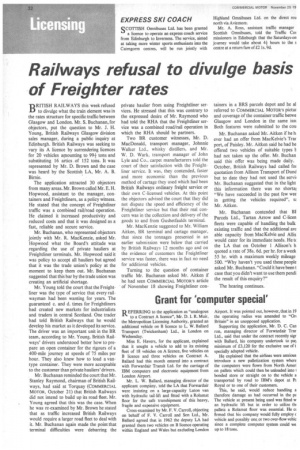Railways refusal to divulge basis of Freighter rates
Page 34

If you've noticed an error in this article please click here to report it so we can fix it.
BRITISH RAILWAYS this week refused to divulge what the train element was in the rates structure for specific traffic between Glasgow and London. Mr. S. Buchanan, for objectors, put the question to Mr. J. H. Young, British Railways Glasgow division sales manager, during a public inquiry at Edinburgh. British Railways was seeking to vary its A licence by surrendering licences for 20 vehicles amounting to 99+ tons and substituting 16 artics of 152 tons. It was represented by Mr. D. Brown and the case was heard by the Scottish LA, Mr. A. B. Bimie.
The application attracted 30 objectors from many areas. Mr. Brown called Mr. E. H. Hopwood, assistant to the manager, containers and Freightliners, as a policy witness. He stated that the concept of Freightliner traffic was a combined rail/road operation. He claimed it increased productivity and reduced costs and that it was designed as a fast, reliable and secure service.
Mr. Buchanan, who represented objectors jointly with Mr. R. MacKenzie, asked Mr. Hopwood what the Board's attitude was regarding the use of private hauliers at Freightliner terminals. Mr. Hopwood said it was policy to accept all hauliers but agreed that it was the trade union's policy at the moment to keep them out. Mr. Buchanan suggested that this bar by the trade union was creating an artificial shortage.
Mr. Young told the court that the Freightliner was the type of service that every railwayman had been wanting for years. The guaranteed c. and d. times for Freightliners had created new markets for industrialists and traders in central Scotland. One trader had told British Railways that he would develop his market as it developed its service. The driver was an important unit in the BR team, according to Mr. Young. British Railways' drivers understood better how to prepare an open container for the rigours of a 400-mile journey at speeds of 75 miles per hour. They also knew how to load a vantype container. They were more acceptable to the customer than private hauliers' drivers.
Mr. Buchanan reminded the court that Mr. Stanley Raymond, chairman of British Railways, had said at Torquay (COMMERCIAL MOTOR, October 21) that British Railways did not intend to build up its road fleet. Mr. Young agreed that this was the case. When he was re-examined by Mr. Brown he stated that as traffic increased British Railways would require a larger road fleet to deal with it. Mr. Buchanan again made the point that terminal difficulties were debarring the
private haulier from using Freightliner services. He stressed that this was contrary to the expressed desire of Mr. Raymond who had told the RHA that the Freightliner service was a combined road/rail operation in which the RHA should be partners.
Two BR customer witnesses, Mr. D. MacDonald, transport manager, Johnnie Walker Ltd., whisky distillers, and Mr. W. D. Wark, transport manager of John Lyle and Co.. carpet manufacturers told the court of their satisfaction with the Freightliner service. It was, they contended, faster and more economic than the previous method of cartage they used which had been British Railways ordinary freight service or their own C-licensed vehicles. At this point the objectors advised the court that they did not dispute the speed and efficiency of the Freightliner service but that their real concern was in the collection and delivery of the goods to and from Gushetfaulds terminal.
Mr. MacKenzie suggested to Mr. William Aitken, BR terminal and cartage manager, that since the tonnages presented in an earlier submission were below that carried by British Railways 12 months ago and on the evidence of customers the Freightliner service was faster, there was in fact no need for additional vehicles.
Turning to the question of container traffic Mr. Buchanan asked Mr. Aitken if he had seen COMMERCIAL MOTOR'S article of November 18 showing Freightliner con tainers in a BRS parcels depot and he al referred to COMMERCIAL MOTOR'S pictur and coverage of the container traffic betwe Glasgow and London in the same issi Both features were submitted to the cou Mr. Buchanan asked Mr. Aitken if he h ever had an offer from MacKelvie's Trat port, of Paisley. Mr. Aitken said he had be offered two vehicles of suitable types t had not taken up the offer. Mr. Buchan said this offer was being made daily. October, British Railways had called for quotation from Allison Transport of Dund but to date they had not used the servil Mr. Buchanan suggested that in the light this information there was no shortal "We have succeeded in the past few wee in getting the vehicles required", sz Mr. Aitken.
Mr. Buchanan contended that BI Parcels Ltd., Tartan Arrow and C-licen fleets were capable of handling the bulk existing traffic and that the additional aw able capacity from Mac Kelvie and Allis would cater for its immediate needs. He ti the LA that on October 1 Allison's h quoted a rate of 38s. 6d. per hr. for a week 55 hr. with a maximum weekly mileage 500. "Why haven't you used these people asked Mr. Buchanan. "Could it have been case that you didn't want to use them pendi the result of this enquiry?"
The hearing continues.












































































































